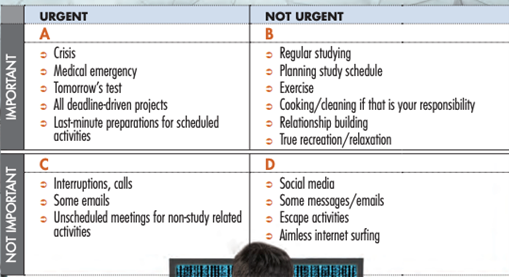The majority of students complain about time and we are the ones who always misuse “this little time” we have by sitting around complaining about the accent of that lecturer and that the lecturing pace is really fast, but I’ve learnt that complaining about it makes it even faster because I’ve lost time while I was complaining. (First-year student, Wits University).
Time is like money – you only have a limited amount of it and you have to decide carefully how you are going to spend it. You have to budget your time, just like you budget your money.
The first step to budgeting your time is finding out what you spend your time on. Keep a detailed diary for a week, writing down exactly how you spend every minute of your day.
Include everything:
- Showering and getting dressed – 40 minutes
- Walking to class – 15 minutes
- Class – 50 minutes × 4 = 200 minutes
- Chatting to friends – 10 + 25 + … Y
You will quickly see where your time goes to!
Now start taking control. How do you decide what is important, what should be done first?

- The top two quadrants of the time management matrix are where you have to focus. Quadrant A is the urgent and important stuff, which needs to be done NOW.
- Quadrant B is what we often overlook or postpone, because it is not urgent – but it is important. This is what Covey calls the “Quadrant of Quality and Personal Leadership”. These activities require planning and initiative. They also require time to reflect.
- Quadrant C is filled with things we get into because we can’t say no. Learn to say no.
- Quadrant D contains the things we do because they are easy, mindless, and help us avoid the hard stuff. Social media, binge-watching series … These are the REAL time wasters!
So, when you feel overwhelmed by everything you have to do:
- Make a list of all of those things.
- Consider them according to Covey’s matrix.
- Put the important, urgent ones at the top, followed by the important, not so urgent ones. Try to delete the ones that fall into the bottom quadrants.
- Now make a to-do list for today.
- Make another one for this week.
- Start at the top and do the first one.
Proper time management ensures that you do not waste this precious commodity. Energy management ensures that you get more done in the time available. You will find advice on how to use your study time better than ever on p. 43. For the moment, just note that you cannot only study.
To stay happy and healthy, you need all of the following:
- Time in – quiet time for meditation and reflection
- Focus time – lectures, tutorials, laboratory work, study
- Physical time – exercise for the body
- Play time – being spontaneous and creative
- Connection time – friends and family, but also connecting to your surroundings and the natural world
- Down time – just being by yourself, quietly
- Sleep time
The time you allocate to each of these will vary from day to day and week to week, but you have to make time for all of them. Sleep seven to eight hours a night. Make sure that you get some exercise. Spend time with your friends. If you plan your schedule, it will all be possible.

